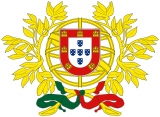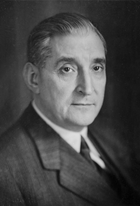| ||||||||||||||||||||||||||||
120 seats in the National Assembly 61 seats needed for a majority | ||||||||||||||||||||||||||||
|---|---|---|---|---|---|---|---|---|---|---|---|---|---|---|---|---|---|---|---|---|---|---|---|---|---|---|---|---|
| ||||||||||||||||||||||||||||
| ||||||||||||||||||||||||||||
 |
|---|
| Constitution |
Parliamentary elections were held in Portugal on 13 November 1949.[1] Following the late withdrawal of the Democratic Opposition, only eight opposition candidates ran against the ruling National Union.
YouTube Encyclopedic
-
1/5Views:1 5861 2011 834179 7831 730
-
Portuguese Legislative Elections (1974-2019) Every month
-
Episode 1.10 Antonio Salazar - The World Has Changed
-
Hungarian Parliamentary Elections (1861-2018)
-
Jack Lang: The Australian Who Almost Started a Civil War
-
Portuguese Colonial War | Wikipedia audio article
Transcription
Electoral system
The elections were held using 21 multi-member constituencies and one single-member constituency covering the Azores, together electing a total of 120 members, 13 of which were from Portuguese colonies.[2]
Voters could delete names from the lists of candidates, but could not replace them.[2] Suffrage was given to all men aged 21 or over as long as they were literate or paid over 100 escudos in taxation, and to women aged over 21 if they had completed secondary education, or if they were the head of a household and met the same literacy and tax criteria as men.[2]
Campaign
The Democratic Opposition withdrew from the election shortly before election day.[3] This left only eight opposition candidates on two lists; a Regionalist list in Castelo Branco including former Prime Minister Francisco Cunha Leal and an Independent Agrarian list in Portalegre including monarchist Pequito Rebelo.[3]
The communist National Democratic Movement and the Youth Movement for Democratic Union both boycotted the election in protest at a lack of free vote.[4]
Results
 | |||
| Party | Votes | % | Seats |
|---|---|---|---|
| National Union | |||
| Independent Agrarians | |||
| Regionalists | |||
| Invalid/blank votes | – | – | |
| Total | 927,264 | 100 | 120 |
| Registered voters/turnout | 1,223,172 | 75.8 | – |
| Source: Nohlen & Stöver | |||
References
- ^ Dieter Nohlen & Philip Stöver (2010) Elections in Europe: A data handbook, p1542 ISBN 978-3-8329-5609-7
- ^ a b c Nohlen & Stöver, p1535
- ^ a b "General Election In Portugal Only Eight Opposition Candidates" The Times, 12 November 1949, p3, Issue 51537
- ^ "Elections In Portugal Opposition Candidates Defeated" The Times, 9 November 1953, p7, Issue 52774

